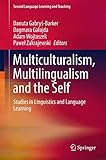Multiculturalism, Multilingualism and the Self [electronic resource] : Studies in Linguistics and Language Learning / edited by Danuta Gabryś-Barker, Dagmara Gałajda, Adam Wojtaszek, Paweł Zakrajewski.
Material type: TextSeries: Second Language Learning and TeachingPublisher: Cham : Springer International Publishing : Imprint: Springer, 2017Description: XIV, 198 p. 5 illus. online resourceContent type: text Media type: computer Carrier type: online resourceISBN: 9783319568928Subject(s): Education | Applied linguistics | Language and education | Education | Language Education | Applied LinguisticsAdditional physical formats: Printed edition:: No titleDDC classification: 407.1 LOC classification: LC8-6691Online resources: e-book Full-text access
TextSeries: Second Language Learning and TeachingPublisher: Cham : Springer International Publishing : Imprint: Springer, 2017Description: XIV, 198 p. 5 illus. online resourceContent type: text Media type: computer Carrier type: online resourceISBN: 9783319568928Subject(s): Education | Applied linguistics | Language and education | Education | Language Education | Applied LinguisticsAdditional physical formats: Printed edition:: No titleDDC classification: 407.1 LOC classification: LC8-6691Online resources: e-book Full-text access | Item type | Current library | Collection | Call number | Copy number | Status | Notes | Date due | Barcode |
|---|---|---|---|---|---|---|---|---|
| E-Books | MEF eKitap Kütüphanesi | Springer Nature | LC8 -6691 (Browse shelf (Opens below)) | Available | NATURE | 1420049-1001 |
Browsing MEF eKitap Kütüphanesi shelves Close shelf browser (Hides shelf browser)
Changing Perceptions of Multiculturalism in the British Public Sphere -- The Use of Humor in the Multicultural Working Environment -- Taboos and Swearing: Cross-linguistic Universalities and Peculiarities -- Expressing the Prison Self -- New Approaches to Multilingualism Research: Focus on Metaphors and Similes -- L2 or L3? Foreign Language Enjoyment and Proficiency. .
This book offers several insights into cross-cultural and multilingual learning, drawing upon recent research within two main areas: Language Studies and Multilingual Language Learning/Teaching. It places particular emphasis on the Polish learning environment and Poles abroad. Today's world is an increasingly complex network of cross-cultural and multilingual influences, forcing us to redefine our Selves to include a much broader perspective than ever before. The first part of the book explores attitudes toward multiculturalism in British political speeches, joking behaviour in multicultural working settings, culture-dependent aspects of taboos and swearing, and expressive language of the imprisoned, adding a diachronic perspective by means of a linguistic study of The Canterbury Tales. In turn, the studies in the second part focus on visible shifts in contemporary multilingualism research, learners' attitudes towards multiple languages they acquire, teachers' perspectives on the changing requirements related to multiculturalism, and immigrant brokers' professional experience in the UK.
5







